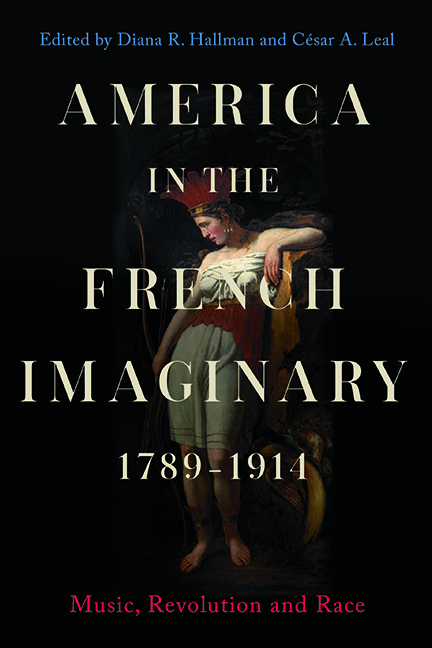Book contents
- Frontmatter
- Dedication
- Contents
- List of Illustrations
- List of Music Examples
- List of Abbreviations
- Editorial Notes
- List of Contributors
- Acknowledgements
- Preface
- Introduction
- Part I American liberté, sauvagerie and esclavage
- Part II Myths of America and Intersecting Identities
- Part III Soundscapes and Sonic Fantasies
- Part IV America, Commodification and Race at the fin de siècle
- Bibliography
- Index
- Music in Society and Culture
3 - Louisiana Imagined: Gender, Race and Slavery in Le Planteur (1839)
Published online by Cambridge University Press: 15 September 2022
- Frontmatter
- Dedication
- Contents
- List of Illustrations
- List of Music Examples
- List of Abbreviations
- Editorial Notes
- List of Contributors
- Acknowledgements
- Preface
- Introduction
- Part I American liberté, sauvagerie and esclavage
- Part II Myths of America and Intersecting Identities
- Part III Soundscapes and Sonic Fantasies
- Part IV America, Commodification and Race at the fin de siècle
- Bibliography
- Index
- Music in Society and Culture
Summary
Following major territorial losses in the Seven Years War (1756–63) and the successful Haitian Revolution in Saint-Domingue (1791–1804), France's Vente de la Louisiane in 1803 marked the end of the empire's colonial ambitions in the United States. Nevertheless, America remained a prominent locus in the French cultural imagination through widely circulated novels such as Chateaubriand's epic Les Natchez, the sociological writings of Alexis de Tocqueville (most notably, De la Démocratie en Amérique), and travelogues such as Frances Trollope's Domestic Manners of the Americans. American settings and characters also appeared on the nineteenth-century Parisian stage in a variety of theatrical works. One of the most immediately popular – if short-lived – of these was Jules-Henri Vernoy de Saint-Georges and Hippolyte Monpou's Le Planteur, premiered at the Opéra-Comique on 1 March 1839. Despite its auspicious premiere, heralded as a great success by several papers, Le Planteur did not enter the long-term repertoire at the Comique, closing after a run of forty-six performances in 1839 and two performances in 1840. Le Planteur's impact on Francophone theatrical culture of the late 1830s and early 1840s included numerous productions in the provinces and abroad, but it was not staged in Paris again until its revival at the Théâtre des Fantaisies-Parisiennes in 1867. This essay focuses on the 1839 Comique production.
Le Planteur arrived four years after another popular American-themed opéra comique, L’Éclair, a romantic comedy set in the vicinity of Boston. Writing for La Revue de Paris, Félix Bonnaire cynically declared:
Since the great success of L’Éclair, the Opéra-Comique is crazy about the New World, not that this rich vegetation inspires it, or that it finds in this atmosphere of sun and fecund vapours the subject of more serious compositions; under the palm trees, they continue to sing the little airs they once crooned so well in their powdery grove of roses. The Opéra-Comique is fond of the New World because the little straw hat of the Creoles goes well with the dark eyes of its female singers and above all because L’Éclair has succeeded.
Regardless of the Comique's desire to capitalise on the success of L’Éclair, the creation of Le Planteur shows how the supposedly ‘light’ genre of opéra comique could engage – albeit in a limited and stereotypical way – with contemporary themes of American slavery in a former French territory.
- Type
- Chapter
- Information
- America in the French Imaginary, 1789-1914Music, Revolution and Race, pp. 100 - 146Publisher: Boydell & BrewerPrint publication year: 2022
- 1
- Cited by

